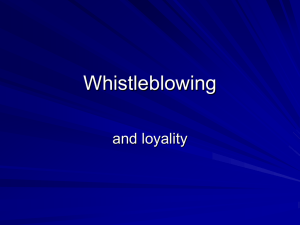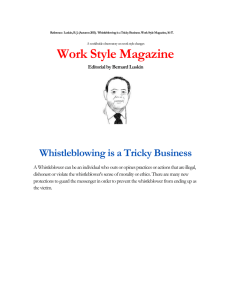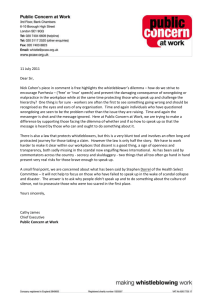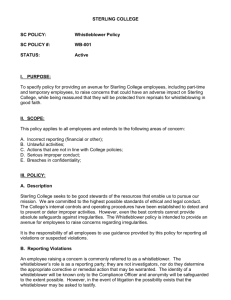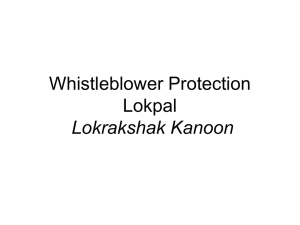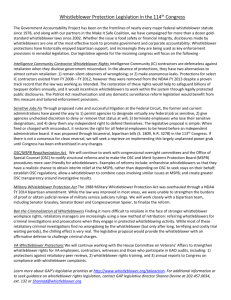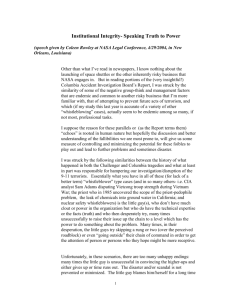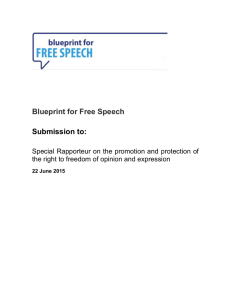Hungarian Civil Liberties Union/K Monitor
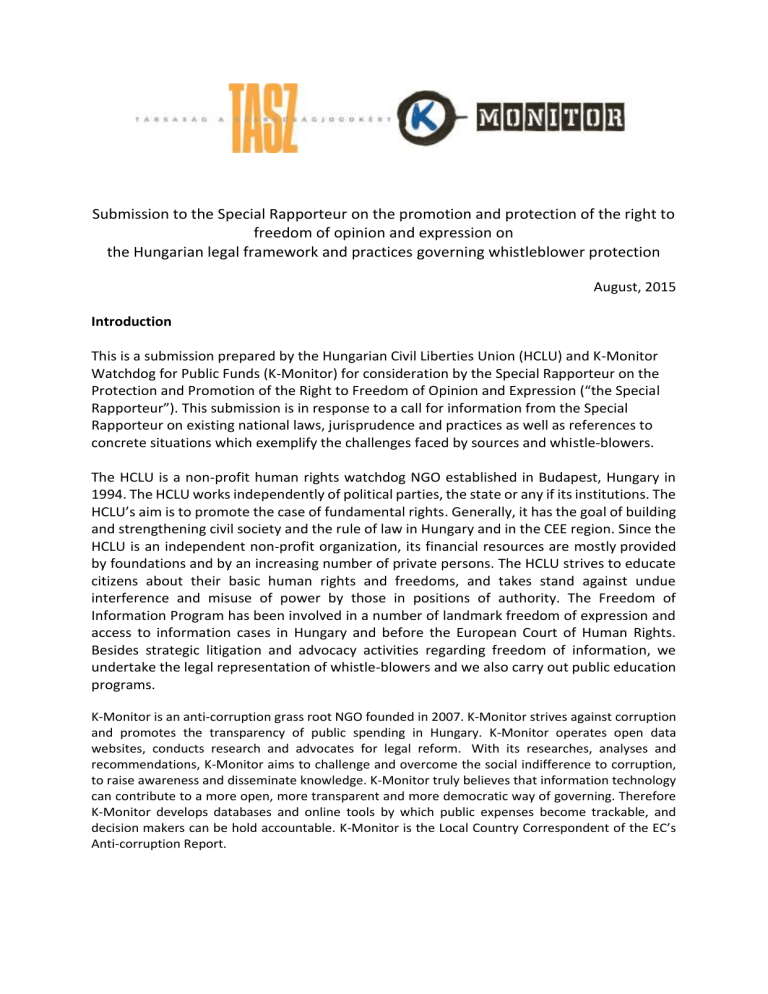
Submission to the Special Rapporteur on the promotion and protection of the right to freedom of opinion and expression on the Hungarian legal framework and practices governing whistleblower protection
August, 2015
Introduction
This is a submission prepared by the Hungarian Civil Liberties Union (HCLU) and K-Monitor
Watchdog for Public Funds (K-Monitor) for consideration by the Special Rapporteur on the
Protection and Promotion of the Right to Freedom of Opinion and Expression (“the Special
Rapporteur”). This submission is in response to a call for information from the Special
Rapporteur on existing national laws, jurisprudence and practices as well as references to concrete situations which exemplify the challenges faced by sources and whistle-blowers.
The HCLU is a non-profit human rights watchdog NGO established in Budapest, Hungary in
1994. The HCLU works independently of political parties, the state or any if its institutions. The
HCLU’s aim is to promote the case of fundamental rights. Generally, it has the goal of building and strengthening civil society and the rule of law in Hungary and in the CEE region. Since the
HCLU is an independent non-profit organization, its financial resources are mostly provided by foundations and by an increasing number of private persons. The HCLU strives to educate citizens about their basic human rights and freedoms, and takes stand against undue interference and misuse of power by those in positions of authority. The Freedom of
Information Program has been involved in a number of landmark freedom of expression and access to information cases in Hungary and before the European Court of Human Rights.
Besides strategic litigation and advocacy activities regarding freedom of information, we undertake the legal representation of whistle-blowers and we also carry out public education programs.
K-Monitor is an anti-corruption grass root NGO founded in 2007. K-Monitor strives against corruption and promotes the transparency of public spending in Hungary. K-Monitor operates open data websites, conducts research and advocates for legal reform. With its researches, analyses and recommendations, K-Monitor aims to challenge and overcome the social indifference to corruption, to raise awareness and disseminate knowledge. K-Monitor truly believes that information technology can contribute to a more open, more transparent and more democratic way of governing. Therefore
K-Monitor develops databases and online tools by which public expenses become trackable, and decision makers can be hold accountable. K-Monitor is the Local Country Correspondent of the EC’s
Anti-corruption Report.
Whistleblower protection in Hungary a.
General rules on whistleblower protection
The new whistleblower act came into force on 1 January, 2014. (The law can be found in
English here: http://corruptionprevention.gov.hu/download/7/a2/90000/KIM%20555_2013-
4.pdf)
According to the act on whistleblowing, whistleblowing does not mean the disclosure of certain data but reporting a problem to the responsible authority. Whistleblowing can relate to anything that is harmful or damaging to a community (it can be a company or an organization) and the cessation of which would serve the interest of that community or the entire society. The subject of whistleblowing is detrimental to the society (e.g.: tax evasion, corruption). In Hungary, whistleblowers turning to the media are not protected, they risk being dismissed from their places of work. In such a case, whistleblowers can even be prosecuted for a breach of confidentiality or charged with defamation.
The new law introduced a new power to the Office of the Ombudsman. Whistleblowers can turn to the Office of the Ombudsman in person or electronically through a specific online system. The electronic way is recommended as it provides better protection for the personal data of the whistleblower. The so called “protected electronic system of whistleblowing” is operated by the Office of the Ombudsman and can be reached on their website. The
Ombudsman does not take the content of the report into consideration but forwards it to the body that is entitled to take action against the violation revealed by the whistleblower.
Instead of the Office of the Ombudsman, whistleblowers can directly turn to the body they consider to be entitled to take action in the case that is being reported. This can be the organization that is the subject to the report or even a certain authority. If the whistleblower has not turned to the adequate body, the recipient body is obliged to forward the case to the competent body and has to inform the whistleblower of that at the same time.
It is not clear, however, whose responsibility it is to investigate whistleblower reports within a certain organization. There is no best practice of who to turn to and the act does not provide any guidance either, besides referring to the body entitled to proceed. The best solution in general might be to report to the person competent in public affairs and it is likely that the case would be investigated by the so called integrity commissioner which is a new position established to reduce corruption (subordinated to the leader of the organization).
According to the Ministry of Justice, which was previously responsible for this legislation, the person responsible for dealing with complaints and whistleblower reports is the head of the organization. Their job is aided by the integrity commissioner (if there is such a position at the certain body). It depends on the certain body whether the direct contacts of the integrity commissioner are disclosed but it is obligatory to make them available if requested. On the websites of institutions the contact details of the departments have to be found. In case of reports filed through the Ombudsman’s reporting system, employees of the office ensure that the report does not fall into the wrong hands.
Besides general aspects, employers have the right to introduce their own codes of conduct which protect public or significant personal interest. If one notices that these are being violated, the violation can be reported to the Ombudsman but the law also enables the employers to establish their own whistleblower-protection system.
Companies can also contract a so called whistleblower lawyer who, theoretically, warrants the anonymity of the whistleblower within the company and takes action to have the case investigated. However, as the whistleblower lawyer is on the payroll of the company subject to the whistleblower’s report, this cannot be regarded as a real guarantee. b.
Oversight mechanism: Who to turn to if the whistleblower’s report is not investigated properly or objectively
It is the duty of the Ombudsman to, without the consideration of the content of the report, inspect if the competent body has conducted the investigation fairly and lawfully. The act does not make it clear if the same rules apply to private companies and state agencies. It is not certain, for example, if the whistleblower can turn to the Ombudsman if the international company that they work for and that has a system for filing whistleblower reports does not investigate the report properly or if the whistleblower suffers retaliation as a result of their report. There is an act defining the competencies of the Ombudsman and it says that regarding the compliance of the investigations they conducted in certain cases reported by whistleblowers, the Ombudsman can only inspect a certain circle of bodies (public authority, local government, law enforcement body etc.) However, the Ombudsman’s website does not speak of such restrictions but of a possibility of revision in general. If the whistleblower’s employment is terminated as a result of his or her whistleblowing activity, the dismissal can be considered unlawful and the whistleblower can turn to the Labor Court. c.
Tracking the report and anonymity
Whistleblower’s reports are, theoretically, investigated within 30 days. The whistleblower is notified only if
- the report has been forwarded to a different body due to a lack of competency
- further information is requested from the whistleblower
- the investigation takes more than 30 days
- the investigation has come to an end, the whistleblower is notified of its result.
If the whistleblower's report was filed through the electronic system of the Ombudsman’s office, the whistleblower will also be contacted through the same system.
According to the law, a “short excerpt of the whistleblower’s report filed through the electronic system and the state of its investigation will be made available online by the Office of the Ombudsman based on the document’s identification number, without any personal or institutional data”, so the report will be public.
The two options offered on the website of the Office of the Ombudsman might be deceptive:
1. Reports can be filed through an online government services portal (called Ügyfélkapu). This raises serious concerns as the whistleblower cannot control what bodies can access their report. The law does not guarantee that this will not happen.
2. “Lodging a whistleblower’s report without identification” (actually, it’s translated as
“Lodging a complaint” on the website, even though there is a difference between a whistleblower’s report and a complaint) implies that the whistleblower does not have to
provide personal data for the identification. This is not true; the name and the address of the whistleblower have to be provided. The whistleblower can request that only the office of the
Office of the Ombudsman can access their personal data. In this case, the Ombudsman will only forward the excerpt to the competent body.
Anonymous reports are not investigated according to a recent amendment to the law.
However, if the body in charge considers the report as serious, it can still decide to start an investigation. d.
Disclosing confidential information (personal data or business/professional secret)
According to the law, every measure detrimental to the whistleblower taken as a result of the whistleblower’s report is unlawful even if it was legitimate otherwise. Except, of course, if the report turns out to be malicious. When filing a report, whistleblowers usually have to disclose confidential information. The law does not explicitly release whistleblowers from their obligation of keeping these secrets, but without this, the entire legal concept would be senseless. The public interest of protecting business secrets ceases to exist if it is used to cover criminal activity.
According to the Ministry of Justice the only secure way in this regard to blow the whistle through the electronic system operated by the Ombudsman because the Office of the
Ombudsman has authorization to manage confidential data. If the whistleblower decides to lodge their report at the body authorized to evaluate the report (according to the whistleblower), it is the whistleblower’s responsibility to ponder whether it is lawful if the certain organization becomes aware of the classified information in question which proves to be an unjustified burden on the whistleblower.
The legally acceptable solution from the state would be to regard reports as bona fide until proven otherwise - just like the presumption of innocence. The state has no right to conduct criminal proceedings or carry out searches until it has ascertained the content of the report.
According to the Ministry of Justice, in the moment of filing their report, whistleblowers become protected. It is the responsibility of the opposing party to prove if the whistleblower was malicious and provided false information. Detrimental measures against the whistleblower can only be justified if their misconduct is proven. However, in case of suspicion of wrongdoing, proceedings aiming to reveal a possible crime are not considered detrimental measures. This means that the protection guaranteed by the law does not prevail in practice.
Criminal proceeding can be conducted in order to investigate whistleblower’s reports, but our point of view is that they can never be directed against the whistleblowers. e.
Financial consequences
Theoretically, if the potential consequences of their report can risk the living conditions of the whistleblower, the whistleblower is eligible for whistleblower-support. The government directive that would regulate the ways of financial compensation has not been drafted yet.
However, the current legislation provides for free of charge legal aid and advocacy for the
whistleblower who can request this at government offices. Unfortunately, the law does not provide any protection for the relatives of the whistleblower.
The current legislation does not reward the whistleblower. There is one exception, however:
According to the Competition Law (The law can be found in English here: http://www.gvh.hu/en/legal_background/rules_for_the_hungarian_market/competition_ac t) whistleblowers who provide indispensable evidence for the Hungarian Competition
Authority for the investigation of cartels. They, if the legal conditions are fulfilled, can get 1%
(but a maximum of 50 million HUF) of the imposed fine for their report. It is important to know that the whistleblower cannot gather evidence illegally. Both the competition law and the penal code make it possible for the participants of criminal acts to be excused from punishment (or get a less severe sentence) if they take part in revealing the offence before the criminal investigation.
Conclusions
The current law does not provide sufficient protection to whistleblowers, and has to be reshaped fundamentally. The government formulated such plans in its draft anti-corruption program, but the issue completely disappeared in the final version.
Experts see the most serious risks in the following provisions:
Anonymous reporting is not supported.
No guarantees are implemented to support unbiased, professional and fair investigation. In the current system there is a high risk that reports are investigated by people/bodies that are subjects of the report.
The law only provides a formal way of appeal, since the Ombudsman’s Office has neither the empowerment nor the capacities to conduct substantive investigations.
Although detrimental measures against the whistleblower can only be justified if their misconduct is proven, in case of suspicion of wrongdoing, proceedings aiming to reveal
a possible crime are not considered detrimental measures. This means that the protection guaranteed by the law does not prevail in practice.
The law does not explicitly release whistleblowers from their obligation of keeping secrets and confidential information.
-
-
-
No protection is guaranteed for whistleblowers turning directly to the public.
Relatives of whistleblowers are not protected.
The system of remedies for whistleblowers is not sufficiently regulated, remaining without an income and legal aid remains a serious risk.
Sándor Léderer
K-Monitor Watchdog for Public Funds
Fanny Hidvégi
Hungarian Civil Liberties Union
